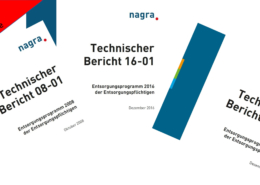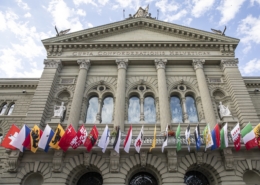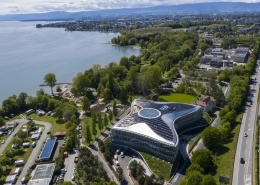Energy research needs the humanities and social sciences
The SWEET funding programme is not only aimed at the technical and natural sciences, but also encourages the participation of the social sciences and humanities in consortia. The objectives of the Energy Strategy 2050 can only be achieved through the interaction of these scientific fields. In a series of interviews, the topic of social sciences and humanities in energy research is examined from different angles. Yasmine Calisesi, Energy Center EPF Lausanne, and Christian Schaffner, Energy Science Center, ETH Zurich, give their views on the important aspects of interdisciplinary collaboration in the SWEET consortia.
You often initiate large consortia with other partner universities and disciplines. How do you form these research collaborations?
Calisesi: The research consortia are formed by the laboratories themselves. EPFL does not interfere in the orientation or choice of research partners. However, the Energy Centre monitors the formation of these consortia and disseminates information to the laboratories concerned.
Schaffner: We always work on the basis of fundamental research questions. What questions do we want to answer? What disciplines and fields do we need to answer them? Then we ask ourselves who in these areas is really interested in working together. Who wants to work outside their "silo" and who has already demonstrated that. And of course, it's also a question of network, contacts, experience with people and research groups. And finally, it has to be good both in terms of content and in terms of people.
In addition to the scientific and technical disciplines, the humanities and social sciences are also important in energy research. How do you involve them in your consortia?
Calisesi: The relevance of including SHS depends on the topic. You have to differentiate on a case-by-case basis. EPFL has the advantage of having two colleges, the College of Humanities and the College of Management, which place SHS at the centre of their research. Other fields of research, such as architecture, mobility and the environment, are obviously closely connected to social and human aspects. The proximity of disciplines within EPFL favours interdisciplinarity and the inclusion of these aspects in research projects.
Schaffner: That's absolutely right and important! Engineers have to understand that technical solutions are not self-evident. And the SHS must understand what is feasible in technology and what is not. And then we have to find a common language. This doesn't happen automatically, but requires a lot of patience and, again, a willingness to reach out to each other.
How can the humanities and social sciences be better integrated into energy research? What needs to be done concretely, on your part, but also on the part of the humanities and social sciences?
Calisesi: The personal networks of researchers remain essential for the formation of research consortia that address the questions posed in the call for proposals. The creation of these personal networks must therefore be encouraged across disciplines. In my opinion, this should be done in appropriate applied research contexts, so that the common goal and the added value of interdisciplinarity become clear.
Schaffner: I think the most important thing is that we strengthen the dialogue together, through events, projects, initiatives and, of course, always seeking joint discussion. Not everyone is comfortable with this, nor is it necessary. But exchange is absolutely central to successful cooperation. It's the only way to build understanding and trust.
Andrea Leu, Senarclens, Leu + Partner AG for SWEET
SWEET - Energy research in interaction with all scientific disciplines
Cooperation between the technical disciplines and natural sciences on the one hand and the social sciences and humanities on the other is very important for the rapid development of the energy system and thus for the achievement of the energy and climate policy objectives of the Swiss Confederation. In both the SCCER and the NRP Energy, particular attention was paid to the integration of scientific and technical solutions into a broader context in order to enable the transfer of results into social and economic practice. In both research programmes, interdisciplinary cooperation has produced results that would not otherwise have been possible.
The first four SWEET-funded consortia, DeCarbCH, EDGE, PATHFNDR and SURE, are good examples of collaborations between disciplines from the natural and technical sciences and the social sciences and humanities. In the coming years, SWEET will continue to issue calls for research projects that will be handled in large inter- and transdisciplinary consortia. Interdisciplinary networking plays an important role in the formation of these consortia. If one has no or few contacts outside one's own discipline, it is not always easy to get involved in consortia. This problem will be discussed in more detail in the next interviews published in the SWEET newsletter.
In addition, the institutions of the ETH domain and most universities have energy research managers who can contribute their experience, so it may be useful to approach these organizations. A platform such as energy-connect.ch can also provide assistance in forming consortia. Finally, general questions about the SWEET program can be sent to sweet@bfe.admin.ch.
 Shutterstock 288462527
Shutterstock 288462527
 BFEVom Umgang mit radioaktiven Abfällen in der Schweiz – Teil 5: Das Entsorgungsprogramm
BFEVom Umgang mit radioaktiven Abfällen in der Schweiz – Teil 5: Das Entsorgungsprogramm  BFEPentalaterales Energieforum: Virtuelles Treffen der Energie-Direktoren
BFEPentalaterales Energieforum: Virtuelles Treffen der Energie-Direktoren  parlament.ch/Monika FlueckigerFrühlingssession 2023 im Zeichen der Stromversorgungssicherheit
parlament.ch/Monika FlueckigerFrühlingssession 2023 im Zeichen der Stromversorgungssicherheit  IOC«Olympic House» wurde für nachhaltiges Bauen ausgezeichnet
IOC«Olympic House» wurde für nachhaltiges Bauen ausgezeichnet 
 ©Flickr - Schweizer Parlament
©Flickr - Schweizer Parlament BFE
BFE
Dein Kommentar
An Diskussion beteiligen?Hinterlassen Sie uns Ihren Kommentar!